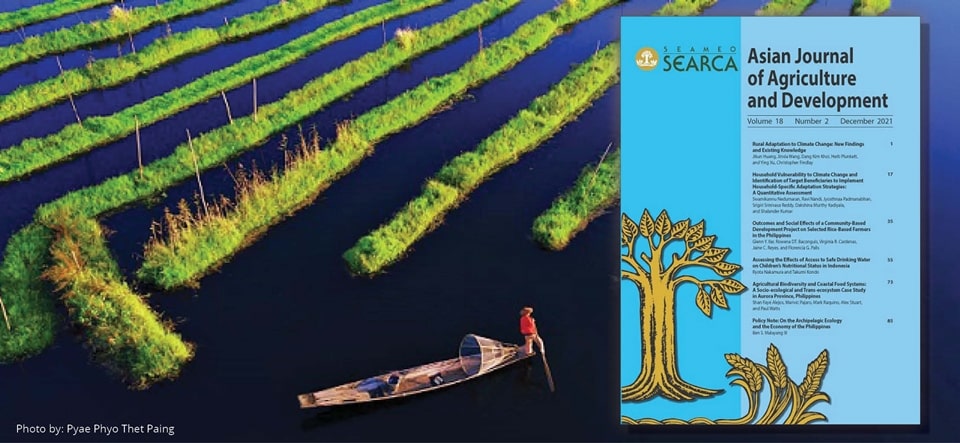Six scientific papers that constitute the December 2021 issue of the Asian Journal of Agriculture and Development (AJAD) recommend various policy interventions that support rural communities vulnerable to climate change impacts, threatened ecosystems, food insecurity, and malnutrition.
Dr. Jikun Huang and his co-authors, in their paper “Rural Adaptation to Climate Change: New Findings and Existing Knowledge”, state that policy support should increase the resilience of farming systems and the adaptive capacities of farmers across Asia. These policies must be developed in the context of structural land-use changes that have occurred because of urbanization and the diversion of water supplies from agricultural to urban uses. Local, regional, and national governments should all be involved in designing the strategies.
Dr. Ben Malayang III’s policy note “On the Archipelagic Ecology and the Economy of the Philippines” underscores that while Philippine marine ecosystems are among the world’s richest in life forms and of high socioeconomic importance to Filipinos, these are highly threatened. Among the most serious threats are the combinations of overfishing; illegal, unreported, and unregulated fishing; habitat destruction; increased demand for fisheries; and climate change. Probably the most serious threat, Dr. Malayang observes, is the “policy blindness” of the country to its vast and rich ecosystem services. Three policy actions are proposed, effectively urging for national policies and regulations that will heighten the protection and security of all Philippine terrestrial and aquatic life forms and their genetic information from internal and external threats.

Based on the result of an interview survey of over 6,000 households in a drought-prone India state, Dr. Swamikannu Nedumaran and his co-authors conclude that a household-level climate vulnerability analysis will inform policymakers and decision makers to develop more responsive interventions. This study titled “Household Vulnerability to Climate Change and Identification of Target Beneficiaries to Implement Household-Specific Adaptation Strategies: A Quantitative Assessment” shows that with targeted information, government investments could mitigate climate change impacts and safeguard vulnerable households. Household-level climate vulnerability analysis also offers better agricultural adaptation strategies to reduce risks attributable to climate variability and extreme events.
Glenn Ilar and his co-authors, in their paper “Outcomes and Social Effects of a Community-Based Development Project on Selected Rice-Based Farmers in the Philippines”, narrated the impact of a project not only on the technology adoption of farmers that led to an increase in their rice yield and income, but on the resulting participation, solidarity, and collective action. Nonetheless, the authors recommend that future community-based projects should focus not only on production technologies but on marketing and enterprise development as well. Interventions should elevate farmers from mere producers of agricultural products to “agri-preneurs” to ensure the sustainability of the project and its benefits.
The study “Assessing the Effects of Access to Safe Drinking Water on Children’s Nutritional Status in Indonesia” shows that the provision of safe drinking water improved the short- and long-term nutritional status of rural children, such as decreasing stunting and wasting by 13 percent and 6 percent, respectively. Authors Ryota Nakamura and Takumi Kondo observed that considering the low availability of safe drinking water in rural areas, improving access to safe drinking water and increasing the level of household income can improve children’s nutritional status. Policymakers should consider ways to improve access to markets for drinking water at the community level, such as lowering the price of drinking water as more cost-effective than installing piped water in each rural household.
The paper “Agricultural Biodiversity and Coastal Food Systems: A Socio-ecological and Trans-ecosystem Case Study in Aurora Province, Philippines” presents a ridge-to-reef case study on biodiversity conservation that focused on reducing agricultural chemicals, contributing to food security, improved water quality, and mitigating maternal malnutrition. According to Shan Faye Alejos and her co-authors, a biodiversity-friendly agriculture approach, developed collaboratively with farmers, resulted to an agricultural protected area supported by a local government ordinance. This policy encouraged the expansion of biodiversity-friendly agriculture and reductions in the chemical load of a key watershed in the study area.
AJAD is an international refereed journal published by the Southeast Asian Regional Center for Graduate Study and Research in Agriculture (SEARCA). AJAD publishes articles resulting from empirical, policy-oriented, or institutional development studies, as well as articles of perspectives on agriculture and development, political economy of rural development, and trade issues. Submissions are welcome all year-round at https://ajad.searca.org/submit. All the new and past papers published in AJAD are available online for free via https://ajad.searca.org/, while print copies are also available through subscription.
AJAD's editorial board is headed by Dr. Cielito F. Habito, professor of economics at the Ateneo de Manila University, Philippines and director of the Ateneo Center for Economic Research and Development. He is also a former cabinet member of the Philippine government, having served as Socioeconomic Planning Secretary and Director General of the National Economic and Development Authority of the Philippines.













